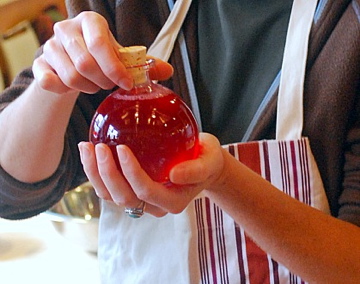 Sweet~Tart Cranberry Syrup in an adorable cranberry-shaped bottle, of course!
Sweet~Tart Cranberry Syrup in an adorable cranberry-shaped bottle, of course!
I really don't like to see anything go to waste.
Yesterday, in our "Cranberry - 3 Different Ways" class at Whole Foods, we made Cranberry~Jalapeno Chutney, Traditional Cranberry Sauce, and Sweet~Tart Cranberry Syrup. I always set out compost bowls near the prep stations, but I realized as I was setting up before class, that there would be very little "waste" in all three of our recipes. That makes me happy!
Only the chutney had anything (relatively) useless to discard -- some onion & garlic skins and a few jalapeno seeds. The only other thing we had left over was a small amount of cranberry solids in the mesh strainer, a by-product of filtering the syrup.
~~~~~
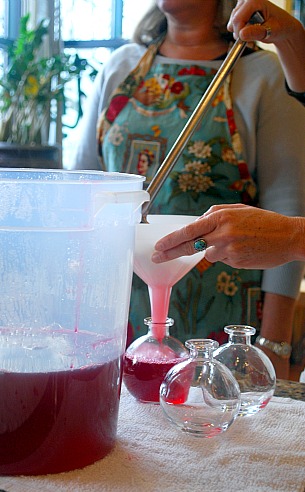 Filtered and cooled syrup, being funneled into bottles.
Filtered and cooled syrup, being funneled into bottles.
For the syrup, we started with 6 cups of cranberries. Once the recipe was cooked - and the syrup strained - we ended up with slightly less than 2 cups of cranberry solids, which I brought home in a jar.
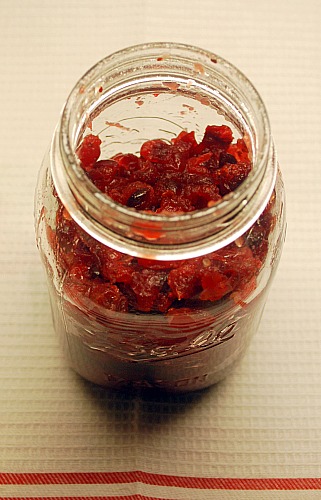 About 1.75 cups of cooked, slightly sweet cranberries.
About 1.75 cups of cooked, slightly sweet cranberries.
I filled the jar with distilled white vinegar...
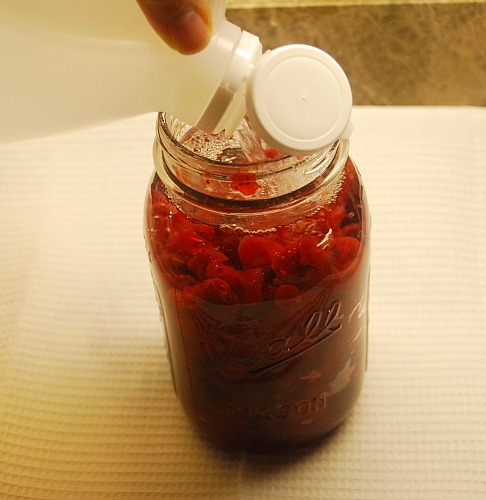
...then wrote today's date on a napkin, and secured it over top of the jar with a rubber band.
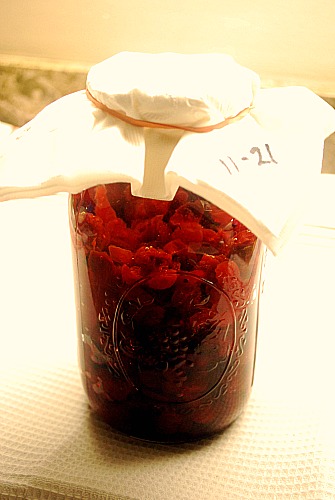
As with other Drinking Vinegars*, l plan to leave the jar on the counter to ferment for at least a week, only checking it once per day to stir it. The difference is, I usually use raw natural fruit, such as chopped pears, apples or pineapple.
This time, not only have the cranberries been cooked, but they are slightly sweetened. (We used them to make syrup, remember?) I think this will only hasten the fermentation process. Who knows...this time my Drinking Vinegar might have a little "3%" kick to it, if you know what I mean.
Stay tuned...
Check out my link to Drinking Vinegar here
Link to cranberry recipes we made in the class
Link to a story about Japan's premier Drinking Vinegar Sommelier
*Fruit vinegars have a long history. The Romans were the first known civilization to indulge in fruit vinegar drinks for their health. Their fruit vinegar drink of choice, which was called Posca, was made from grapes or figs and mixed with water and was thought to refresh and energize the body.
Fruit vinegars have a delicate flavor and aroma with a slightly sweet taste and pair well with fruit and other salads. They are quite popular in European countries and Japan, where fruit flavore vinegar drinks have experienced a dramatic upward trend in recent years, with the demand tripling from the years 2000 to 2004.
Recent studies have confirmed that vinegar is indeed beneficial to our health. Ingesting two to three tablespoons of vinegar diluted in a small glass of water before meals, especially those high in carbohydrates, appears to lower blood sugar levels. Additional studies indicate that drinking vinegar may also help to promote weight loss. The ascetic acid in vinegar contributes to saity or a feeling of being full.